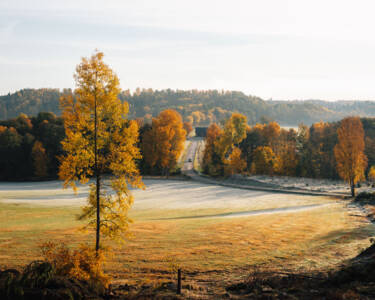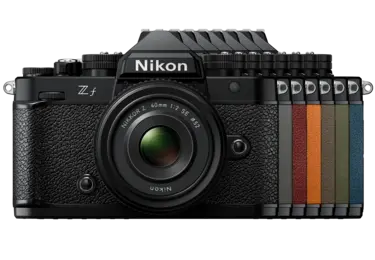The most versatile lens in your bag

Nikon Creator Linus Bergman puts the new NIKKOR Z 50mm f/1.4 to the test
Self-taught photographer Linus Bergman is known for the use of colour and light in his work, whether it’s images of his beloved Scandinavian landscape, street portraits or advertising shoots for clients including Red Wing shoes. Nikon magazine challenged Linus to test the versatility of the NIKKOR Z 50mm f/1.4 with his Zf. Read on for his advice to anyone picking up a classic prime lens for the first time.

“Rounding a corner, I spotted a beautiful deer, and we had a stare-off, leaving me just the enough time to capture the moment. This photo is raw and authentic and captures the quiet connection between us.” 50mm, 1/4000 sec, f/4.5, ISO 640
What makes a 50mm lens so versatile?
Linus Bergman: The 50mm lens has earned iconic status among photographers for good reason. Historically, it’s been the go-to choice for those seeking a lens that can adapt to multiple shooting styles, from portraits to street photography. Its versatility lies largely in its perspective, which is closest to the human eye’s natural field of view. This ‘true-to-life’ quality allows it to render scenes with an honesty and simplicity that photographers have found invaluable for decades. Personally, I’ve been more of a 35mm shooter throughout my career. However, in recent time, I’ve come to appreciate the 50mm focal length more and more. Its framing is slightly tighter than the 35mm, which encourages me to focus on details and elements within the scene without straying too far from a natural perspective.


What’s great about this particular one?
Paired with my Nikon Zf, this 50mm lens is a dream. It has a solid, substantial feel that gives me confidence in its build and durability. There’s a certain heft to it that I love – it feels like a tool made for professionals, ready to deliver consistently high-quality results. Together, the Zf and this lens create a balance that makes shooting enjoyable and, ultimately, rewarding.
“With soft light and untouched landscapes, an early morning in the Swedish countryside provided the perfect scene. Here, I captured the peacefulness of the moment with minimal editing to keep the natural tones intact.” Left to right: Early morning: 50mm, 1/1000 sec, f/4.5, ISO 320; Deer and landscape: 50mm, 1/4000 sec, f/4.5, ISO 640
What are the advantages of using a fast 50mm prime?
Prime lenses are my go-to for many reasons. The so-called ‘limitation’ of a fixed focal length actually becomes a strength over time. With a prime, you’re encouraged to move your feet and engage with your surroundings, honing your composition skills in a way that zoom lenses don’t quite facilitate. A fast 50mm prime, especially, lets you shoot in low light, create beautiful, shallow depth-of-field shots and gives you creative control over your background blur. In the long run, these features push you to work within the constraints, making you a more intentional and skilled photographer.
“To test a longer shutter speed, and to see how well the lens handled a fast-action scene, I captured my brother doing a wheelie. The result gave me a solid sense of the lens’ capabilities for movement-heavy photography. This is shot at f/16, shutter speed 1/60-1/40 secs.”
What would you ideally use it for in your own work?
In my work, the 50mm is my choice for intimate scenes and detail-focused shots. While I primarily use it for smaller compositions, it’s equally capable of capturing broader landscapes or lifestyle scenes with just a step or two back. Coming from years of using a 35mm, I have to remind myself to shift my positioning with the 50mm. That adjustment opens up new perspectives, making the 50mm a versatile tool for my storytelling approach, whether it’s a close-up moment or a sweeping landscape.
What tips would you give to beginners using a 50mm as their first prime lens?
When I first picked up a 50mm, it felt intuitive – it almost mirrors the way we see the world. For beginners, it’s the perfect focal length for quick, spontaneous shots. The lack of zoom also encourages ‘zooming with your feet’ – moving around the scene to find the best perspective. This practice helps you understand your camera’s capabilities and enhances your eye for composition over time. Experimenting with different apertures on the 50mm will also show you how much control you have over depth of field, a skill that’s vital for creative photography.


Your work includes landscapes, interiors, product shots and street photography. Do you have a favourite? What connects these different styles in your approach?
I love the variety that photography brings. Over the years, my focus has evolved from architecture to landscapes to portraits, each with its own charm and challenges. Social media can sometimes oversaturate certain genres, which pushes me to switch things up. I’ve found that projects that let me find unique places and work with interesting people in front of the camera are especially rewarding, as they combine elements from many of these styles. My approach remains consistent: I aim to capture a scene or subject as naturally as possible, but with a fresh perspective. When I’m out in a beautiful landscape or a bustling city, I’m more carefree, shooting for the sheer joy of it. Working with people often comes with a professional pressure, but it also allows me to weave together my interest in various subjects, which keeps my work challenging but fun! In terms of process I try to photograph with my Zf how I would shoot with an old ‘point and shoot’ film camera. So it’s pretty straightforward and relies on my gut feeling. My editing style leans toward a natural feel, reminiscent of analogue film but with a modern, punchy twist. For these shots, I used my newly released ÅÄÖ Preset pack, which I rely on for about 95% of my images. It helps me achieve the balance of authenticity and vibrancy that I aim for in my work.


What do the coming months hold for you? Any projects that you can tell us about?
I plan to return to Lofoten to continue a long-term project that I’ve been working on for the past seven or eight years. Each trip there offers new inspiration and a chance to add another layer to this ongoing series (without giving too much away about it).
Introducing the Nikon Zf

For limitless creativity













